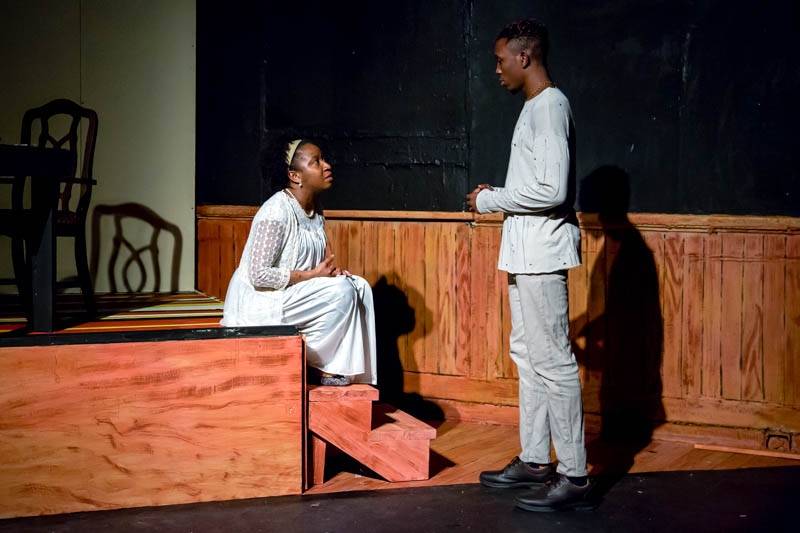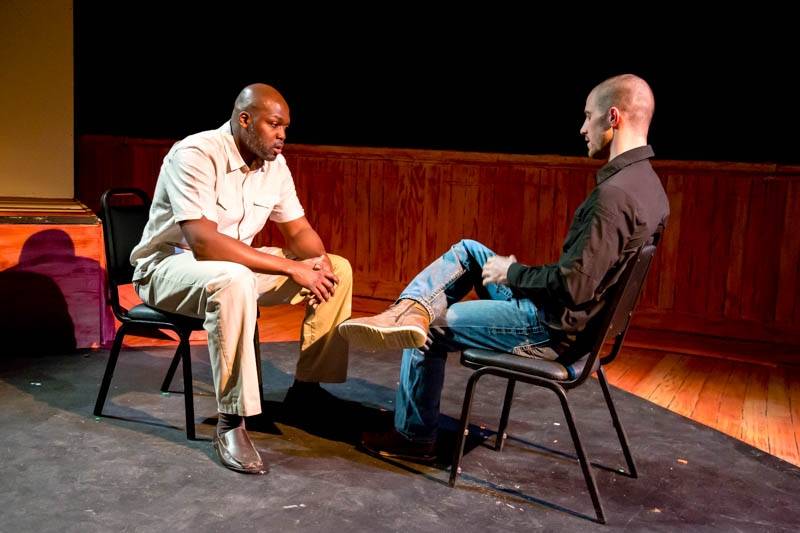When it was revealed that the CIA was using sleep deprivation as an “advanced interrogation technique” after the 9/11 attacks, many health and mental-health professionals gave their opinions that this definitely qualified as torture. Just five years prior to those attacks, playwright Adrienne Kennedy described her own personal torturous experience of navigating the justice system after her son was brutally attacked by a police officer. The result is Sleep Deprivation Chamber, a play of disorienting images and loose associations all coordinating into a grueling and emotional interrogation geared to make the audience feel as much as the players. The Celebration Company at the Station Theatre’s production, directed by Latrelle Bright, works hard to bring that vision to our community’s attention.

Drama is about conflict, and while this particular season at the Station has been full of (literally) hard-hitting topics, this particular play is the only one so far that risks being labeled a “social-justice drama.” For whatever reason, even in these politically heightened times, the fact that the conflict is between two societal factions as opposed to just 2 or 3 interpersonal kerfuffles means that audiences might have to be persuaded a little harder to go see it. Watching fictional individuals work through difficulties can be cathartic; watching a group of people be treated unjustly and feeling helpless to stop it is entirely something else. Even as an ally or a member of the group, going out to a show like this can require effort, even a conscious decision.
And, in my estimation, if an audience member is going to commit to the empathetic and intelligent effort it takes to watch a consciousness-raising drama, that means the theatre company should make the same commitment to do their damndest to present the play to the best of their ability. For the most part, the Celebration Company does that—even if the result isn’t 100% successful.
The lead characters—mother Suzanne Alexander and son Teddy Alexander, stand-ins for the real-life playwright and her son—are the ones whose suffering is central to the plot. Therefore, the actors playing them have the most difficult roles and spend almost the entire intermission-less runtime onstage. These actors, Rhonda Henderson and Preston Roseborough, have just begun their acting careers, both having debuted in last summer’s production of Dreamgirls, also directed by Bright.

 As a reminder that the mother’s anxiety has kept her from sleeping, Henderson’s Suzanne spends the play in a nightgown and robe, narrating the letters she endlessly writes as video projections appear behind her. Once or twice she comes down onto the stage below, to join her family, but the lower levels remain primarily the domain of her male relations and the police. As the play progresses, her monologues become more disconnected and repetitious, verging on incoherent. Henderson portrays the dreamlike state of confusion Suzanne occupies like she has disassociated from the events and reality around her, only coming back to earth for moments of hyper-augmented emotional distress.
As a reminder that the mother’s anxiety has kept her from sleeping, Henderson’s Suzanne spends the play in a nightgown and robe, narrating the letters she endlessly writes as video projections appear behind her. Once or twice she comes down onto the stage below, to join her family, but the lower levels remain primarily the domain of her male relations and the police. As the play progresses, her monologues become more disconnected and repetitious, verging on incoherent. Henderson portrays the dreamlike state of confusion Suzanne occupies like she has disassociated from the events and reality around her, only coming back to earth for moments of hyper-augmented emotional distress.
 Teddy’s role is anything but dreamlike, making physical and emotional demands of Roseborough which would be daunting for an experienced actor. He must transition from acting like an actor (portraying a player in a college production of Hamlet) to reliving the chaos of his beating at the hands of law enforcement; from being questioned after he was arrested by police officers who want to trip him up, to being questioned by lawyers who assume the worst, to placating his anxious mother while balancing his own fears of going to jail. I was so caught up in his emotional portrayal that it didn’t strike me until later how difficult his job must have been.
Teddy’s role is anything but dreamlike, making physical and emotional demands of Roseborough which would be daunting for an experienced actor. He must transition from acting like an actor (portraying a player in a college production of Hamlet) to reliving the chaos of his beating at the hands of law enforcement; from being questioned after he was arrested by police officers who want to trip him up, to being questioned by lawyers who assume the worst, to placating his anxious mother while balancing his own fears of going to jail. I was so caught up in his emotional portrayal that it didn’t strike me until later how difficult his job must have been.

 Especially coming from new actors, Henderson and Roseborough work diligently to bring their characters’ experiences into reality. Their effort is apparent and applause-worthy. Many of the ensemble performers are quite notable as well: Prince F. Robertson, as Teddy’s father, David Alexander, broke my heart whenever he appeared; Cedric Jones plays beyond his years as Uncle March, a Civil Rights leader now wandering through dementia; and Jess Schlipf steals a scene as a homeless person.
Especially coming from new actors, Henderson and Roseborough work diligently to bring their characters’ experiences into reality. Their effort is apparent and applause-worthy. Many of the ensemble performers are quite notable as well: Prince F. Robertson, as Teddy’s father, David Alexander, broke my heart whenever he appeared; Cedric Jones plays beyond his years as Uncle March, a Civil Rights leader now wandering through dementia; and Jess Schlipf steals a scene as a homeless person.

On the technical side, the set design by Jaclyn Zimmerman is unique and evocative, using multiple levels significantly. The fights, which are central to the story and the emotional content, are staged safely and believably thanks to choreographer Zev Steinberg, a great local asset who has gone largely unmentioned but worked quite hard all season long.
My only quibble there would have to be with one of the aforementioned projected images. There are frequent references, in the mother’s dream-state monologues, to Canadian Soldiers. Lakeshore residents might know these disgustingly ugly type of moth perhaps by their other name of mayfly. In the image projected every time Canadian Soldiers are mentioned, the insect shown is a much more elegant, more “photogenic” moth, with lovely fluttery wings. To me, this felt as though it undercut the truth of Suzanne’s recollection in a play that’s all about how one’s visceral memory of an impactful moment can change a life forever.
Going back to the extra effort required to sell a drama like this… it strikes me that, if an audience sees a play like this performed poorly, it reinforces the poor reception of plays like this within the community. It creates the association that dramas which take on an issue are preachy and noisome without achieving the narrative fluidity of a more conventional play. One might blame the genre of play rather than accepting that one particular performance wasn’t very high quality. In other words, doing this badly does a disservice to the genre, and it discourages audiences to come out and connect to the message.
With that in mind, and out of respect for the truly good elements of the show, I won’t go into too much detail about the production’s shortcomings. Many people worked very hard to bring an important social message to our community, and it is worth hearing. That being said, I was dismayed to see that at least one of the more seasoned performers in the cast quite obviously did not have their lines memorized by the night after opening. I say at least one, because when this happens it affects every player who has dialogue and it becomes impossible to tell who else is uprepared or merely reacting to the wrong prompt. I hope that, by the time this publishes, the actors in question will have corrected that situation so that audiences after mine will have a better, more fully realized experience.
 Regardless of unfortunate circumstances, the majority of players brought hard-earned and emotionally engaging portrayals to the audience. The story, the brutality, and the extraordinary frustration of the situation and its long-lasting effects were apparent to everyone in attendance. The final outcome was so understated and lifelike that we all let out our held breaths slowly, and were startled by the curtain call. It was a powerful moment, and nearly two hours of worthwhile drama we had all witnessed together as a community.
Regardless of unfortunate circumstances, the majority of players brought hard-earned and emotionally engaging portrayals to the audience. The story, the brutality, and the extraordinary frustration of the situation and its long-lasting effects were apparent to everyone in attendance. The final outcome was so understated and lifelike that we all let out our held breaths slowly, and were startled by the curtain call. It was a powerful moment, and nearly two hours of worthwhile drama we had all witnessed together as a community.
Sleep Deprivation Chamber runs for another two weeks: this Wednesday the 29th through Saturday, April 8th. You can reserve your tickets online or by calling the ticket office at 217.384.4000 and bringing cash to your chosen showing. Weekday (Wed/Thurs/Sun) tickets are $10 while weekend (Fri/Sat) are $15.
All images by Scott Wells.








